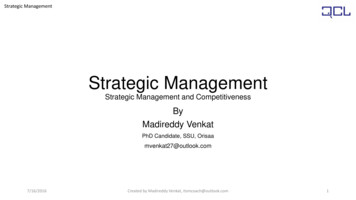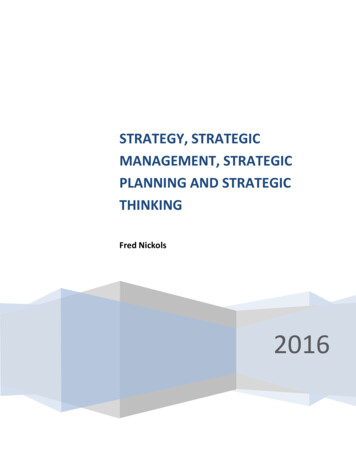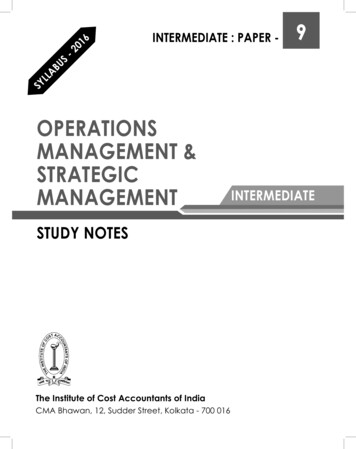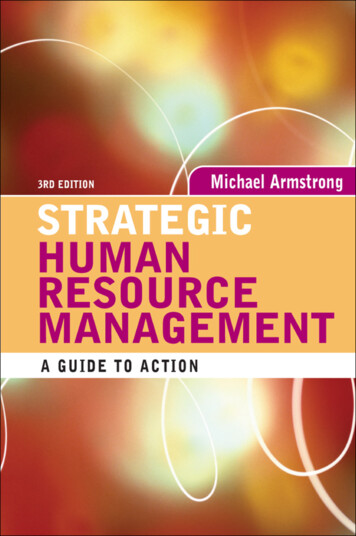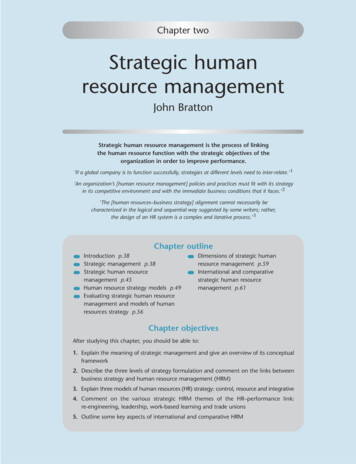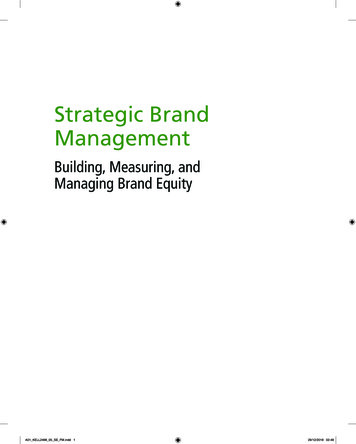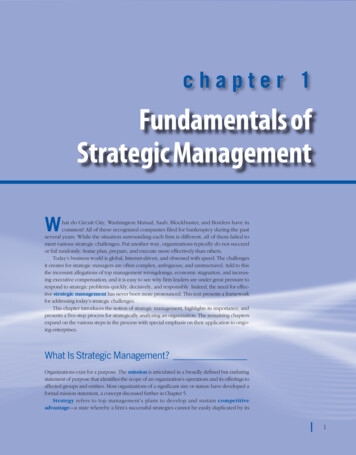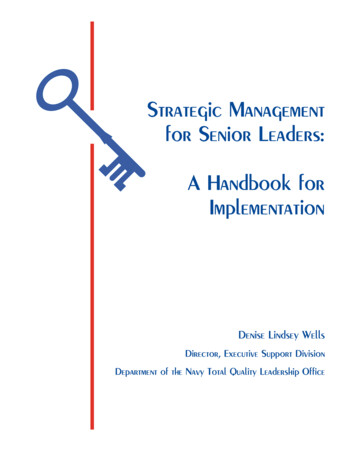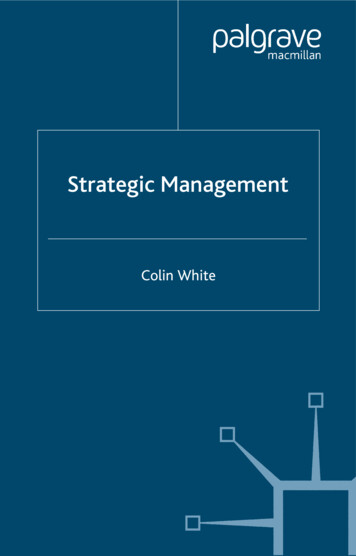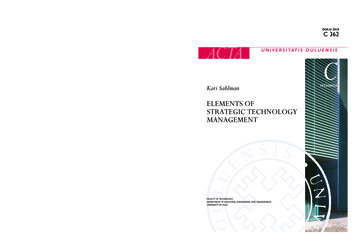
Transcription
1CHAPTERWHAT ISSTRATEGICMANAGEMENT?Is strategicplanningIslamic, or is itbidah (aninnovation)?You are the best of peoples, evolved for mankind, enjoiningwhat is right, forbidding what is wrong, and believing in Allah.If only the People of the Book had faith, it were best for them:among them are some who have faith, but most of them areperverted transgressors. (Qur'an, 3:110)You know your Islamic organization needs to develop a clear strategy. You know there is no clear direction in what your mosque orIslamic institution does. You have suggested that your organizationrethink what it is doing. Others ask if strategic planning is Islamic at all,or if it is bidah (an innovation)? As you ponder over this question, yourecall some facts.Strategic Planning and Implementation for Islamic Organizations1
1WHAT IS STRATEGIC MANAGEMENT?Strategic Planning in the Bible, the Qur’an, and the SirahEven before the Qur’an was revealed,1 we find Biblical support forstrategic planning.2 Moses (as),3 a consummate strategist who led thenation of Israel out of Egypt, grappled with his role as leader. Hisfather-in-law Jethro (Shu ayb) understood his plight and taught himstrategic human resource planning, namely, how to manage his workby delegating parts of it according to a well-established hierarchy.In the Bible, each of Israel’s twelve tribes had separate areas in thecamp, their own leaders, and specific responsibilities. Each tribe dealtwith the day-to-day issues, while Moses focused on getting them totheir overall goal.Prophet David was a superb strategic thinker who understood strategy even while still a youth. For example, he did not attack Goliath’sstrengths but was inspired by Allah to attack his weakness. ProphetJoseph also used strategy very effectively. In Surah Yusuf, he planned ascenario that would shame his brothers into repentance. By placing adrinking cup in one of his brothers’ saddlebag and accusing them of theft,he prompted them to admit their real crime and deal with their past misdeed. Finally, as pointed out by Altalib,4 Prophet Noah reacted in a proactive strategic manner by building the ark before the flood, selecting pairsof animals, and working collaboratively with the believers.This strategic awareness shown by the prophets is but a reflectionof the planning of the Supreme Strategist, the One whose Messagethey were spreading. Repeatedly, the Qur’an reminds us that Allah isthe best planner. For example, Allah talks about His planning (Qur’an,86:15) or the signs of His Perfect Plan. For example, He refers to thecareful crafting of the natural environment as one of His signs:2Strategic Planning and Implementation for Islamic Organizations
WHAT IS STRATEGIC MANAGEMENT?Do you not see that Allah sends down rain from thesky? With it, We then bring out produce of various colors. Inaddition, in the mountains are tracts white and red, of variousshades of color and black, intense in hue. And so amongmen and crawling creatures and cattle are they of variouscolors. Those truly fear Allah among His Servants whohave knowledge: For Allah is exalted in Might, Oft-Forgiving.(Qur’an, 35:27-28)His Plan encompasses everything. No matter how perfectly one mayplan, Allah is the Decider."There is nointelligencegreater thanplanning."– ProphetMuhammadDid they, then, feel secure against Allah’s Plan? But no onecan feel secure against the Plan of Allah except those(doomed) to ruin! (Qur’an, 7:99)Pharaoh’s relentless pursuit of Moses and the Israelites, the selfserving plan of Joseph’s brothers to kill him, and Zulaykha’s cunningentrapment of Joseph are examples of how Allah’s Plan defeatedthose of various individuals. The stories of ‘Ad (Qur’an, surah 11) andThamud (Qur’an, surah 7) also remind us of the plight of nationsthat were destroyed when they became arrogant and transgressedthe limits that He had set for humanity.The fact of Allah’s plan should not deter us from planning, as longas we acknowledge His supremacy. In many circumstances, planningis helpful and may provide an advantage. This is why ProphetMuhammad said: "There is no intelligence greater than planning."5Many incidents in his life reflected strategic planning: the migrantsfrom Makkah to Madinah in September 622 CE followed a route thatwas exactly the opposite of what his pursuers had anticipated.Inspired by Allah, he concluded the treaty of Hudaybiyyah, whichturned out to be a clear victory for the Muslims and provided a muchneeded strategic, short-term respite. Immediately after agreeing tothis treaty, he preempted the Companions’ apparent lethargy byfollowing the advice of one of his wives, Umm Salamah, to slaughterhis sacrificial animal first. Positioning the Muslims’ army, draining thewell at Badr, positioning the Muslim archers on Badr’s hills, and usingStrategic Planning and Implementation for Islamic Organizations3
1WHAT IS STRATEGIC MANAGEMENT?the trench as a defensive technique at Khandaq are vivid testimoniesof the Prophet’s appreciation of planning and stratagems.Shar i and Tabi Principles of Strategic PlanningTabi principlesrelate to themundanewhere manappliesreason andexperience torun his dailybusinesswhereas shar iprinciplesconvey theDivine rulesthat man mustobservesimultaneously.4The Shari ah clearly describes the efficient and effective conductof Islamic for-profit and not-for-profit organizations as being encompassed within the concept of ihsan (excellence). When Islamicorganizations seek to incorporate Islamic values in their modusoperandi, they resort to the Shari ah’s guidelines. However, theShari ah does not enunciate operationally how an organization is toachieve sustainable competitive advantage in a highly turbulent,hypercompetitive environment. Rosly draws a distinction betweenshar i and tabi principles in business strategy.6Overall, the strategic conduct of any Islamic business can be segmented into two areas: shar i and tabi . As Rosly indicates, "TheTabi principles (i.e., the rational and empirical – an aspect of dunya[the world]) relate to the mundane where man applies reason andexperience to run his daily business, while the Shari principles (i.e.,Allah's command) convey the Divine rules that man must observe[while] doing the same. Both shall remain inseparable. The rationaland empirical are driven by the spiritual values of the Qur’an."7Since the shar i principles are derived from the Qur’an and theSunnah, they are common in all aspects of business transactions:Islamic banking, treatment of employees, conduct of partnerships,and so on. These principles originating from Allah separate the halal(lawful) from the haram (forbidden) and are intended to foster justice( adalah) in business transactions. When those engaged in businessbehave according to the Shari ah’s principles, they are fulfilling theakhirah’s (Hereafter) requirements of the Islamic worldview.While the Shari ah’s principles describe how Islamic transactionsare to be conducted in a just and equitable manner, other dimensionsof market activity need not depend on explicit divine guidance. This isthe tabi (natural) aspect of market activities that defines efficiency and,therefore, performance. It is nature's way. Tabi values, which are universal, can be used by all people, irrespective of faith and belief. Forexample, a company can increase output by reducing per unit costs. Ineconomics and in manufacturing, this process is known to achieveeconomies of scale. To increase sales, a business should first conductmarket research. To manage a complex multi-billion dollar project, itStrategic Planning and Implementation for Islamic Organizations
WHAT IS STRATEGIC MANAGEMENT?should use such project management techniques as PERT (ProgramEvaluation Review Technique). The tabi aspect of a business cannotbe ignored, even when it runs under an Islamic label, for both Muslimsand non-Muslims are expected to obey it. Its use is not so much aboutfaith (iman) as it is about efficiency and competence – although ethics(akhlaq) always apply to Muslims’ conduct.Thus, when mapping out a strategy, one notices that the Shari ah doesnot describe the strategic management process and its associated techniques, and that Shari ah scholars are not trained to be strategy experts.They can only help business people keep the halal distinct from the harambased on Qur'anic injunctions. Consider the case of Islamic financialplanning: After screening for halal and haram investment instruments andareas, the tabi aspects become dominant process criteria in terms of theprice-earnings ratio, return on investment, earnings per share, and otherfinancial performance measures.Similarly, as an Islamic organization seeks to develop and implement its strategy using tabi principles, it must always make sure thatit observes shar i principles. As Rosly stresses,8 knowledge derivedfrom non-divine sources (i.e., human) cannot be downgraded asungodly, for the aql (reason) is also divine in nature. Humanity candiscover Allah by thinking about and contemplating His Signs. The aqlis a powerful instrument to explain the nature and, therefore, thegreatness of Allah. However, if it is deprived of divine guidance, itbecomes short-sighted and unable to produce credible tabi principlesfor humanity’s enjoyment.Key Concepts in Strategic ManagementStrategicmanagementasks threebasic quetions:Where are wegoing? Wherecould we begoing? How dowe get there?Strategic management deals with the organization’s behavior withinits external market, and its internal roles, processes, structure, anddecisions in order to enable the organization to function at its peakwithin that external environment.9 Strategic management asks threebasic questions: Where are we going? Where could we be going?How do we get there?10Strategic management involves both strategy formulation and strategy implementation. The two primary phases of strategy formulationare commonly referred to as strategic planning and tactical or operational planning. Formulating either a strategic or an operational planis relatively easy, given that anyone can sit down and come up with awonderful list of resolutions or goals. But implementing a plan is muchStrategic Planning and Implementation for Islamic Organizations5
1WHAT IS STRATEGIC MANAGEMENT?Strategicplanning is theprocess bywhich organization decisionmakersdeterminewhere theorganizationis heading,what its selfconcept is,what its longterm prioritiesare and how itwill achievethem.6more challenging, and this is where the most effective organizations– whether Muslim or not – engage in strategy-supportive action.In contrast, a typical Islamic organization rarely transitions to implementation.11 It often forgets that strategic thinking needs to be built intoeverything it does. In each of its actions and activities, you and yourorganization need to be strategically aware and ask how this action oractivity relates to your overall strategy and how it brings you closer toour ultimate aim: serving the Creator.Strategic planning can be defined as "the process by which the guiding members of an organization envision its future and develop the necessary procedures and operations to achieve that future."12 Brysonregards it as "a disciplined effort to produce fundamental decisions andactions that shape and guide what an organization is, what it does, andwhy it does it."13 When these definitions are taken together, we noticecertain key elements. Strategic planning: Encompasses decisions and actions that have a long-termimpact, Is a process that enables decision makers to be proactive, Involves identifying the organization’s idealized potential and Provides a framework that allows for internal consistencyamong all of the decisions and activities of the organization’svarious sections.working toward it, andAn operational plan builds upon the strategic plan emerging from thestrategic planning process and focuses on specific short-term actionsand results. After developing a strategic and an operational plan, youimplement your strategy by acting upon it. Remember that there is nosuch thing as a perfect strategic plan; an organization that spends toomuch time perfecting a plan is spending too little time implementing it.This endless fine-tuning instead of acting is referred to as "analysisparalysis." How many communities have spent months or years planning the perfect mosque location or perfecting their Islamic schoolcurriculum, only to find out that they have lost a whole generation ofMuslim youths who could wait no longer? As General Patton once said,"A good plan executed today is better than a perfect plan implementednext week."14Strategic Planning and Implementation for Islamic Organizations
WHAT IS STRATEGIC MANAGEMENT?Why Strategic Management?Strategic management is important because, if properly planned, executed, and monitored, it facilitates the move toward excellence in the running of an organization. In particular, strategic management:The concept ofihsan demandsthat Muslimsachieve excellence in everyhalal endeavorthey engage in. Enhances the organization's ability to be proactive, anticipateproblems, and stay focused on both the future and the present. Allows decisions to be based on the best alternatives, since theystem from the group’s consensus (shura). Therefore, it encourages the best possible judgment based on what is frequently verylittle information. Improves the participants’ understanding and motivations, sincethey are following a clear and consistent vision. Instills unity and internal consistency among all decisions andactions. Provides a cognitive frame of reference to guide decision makers,even if the situation on the ground makes the plan obsolete. Facilitates strategy implementation and decreases resistance tochange. This advantage is similar to what is derived from the consultative dimension of Theory Z (Japanese management).Japanese managers discovered that when they involve personnelin the decisions that affect them and
Strategic management deals with the organization’s behavior within its external market, and its internal roles, processes, structure, and decisions in order to enable the organization to function at its peak within that external environment.9 Strategic management asks three basic questions: Where are we going? Where could we be going?
